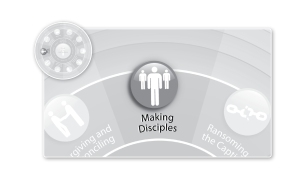Part VIII of our series on Making Disciples
We started off talking in our last post about the importance of an “aggressive, comprehensive, systematic plan for discipleship” before discussing the differences between therapy and discipleship.
Today, I want to start off by admonishing every Christian disciple-maker with this:
Don’t be spontaneous when it comes to discipleship.
This is not only the advice given by D. Michael Henderson, one of my favorite disciplers, it’s also spot on biblical.
Why do we learn the Nicene Creed? Because it is the church’s “bookshelf”—if someone gives you a “book” (some kind of theological truth) and it doesn’t fit on that bookshelf, then reject it; it’s not part of the “everything I have commanded you” that Jesus said forms the curriculum of discipleship. So Henderson says:
Regarding the subject of conversations, in one of my classes a student objected to what he considered regimentation of discussions.
“I just like to be free to talk about whatever comes up,” he said. “I don’t like to be bound by rules. I want to say whatever comes to my mind.”
To which I answered: “It’s not all about you.”
Lots of people want to talk, and they do. They drone on and on about whatever strikes their fancy. But self-centered conversations don’t accomplish much.
If we want to serve God first, others second, and ourselves last, we need to shape the direction of our discourse.
Denying ourselves the ability to dwell on the daily duties of life and instead focus on the deep, voluntary duties of discipleship is a recurring theme for both Jesus and Paul. Like in Luke 9:57-62:
As they were going along the road, someone said to him, “I will follow you wherever you go.” And Jesus said to him, “Foxes have holes, and birds of the air have nests, but the Son of Man has nowhere to lay his head.”
To another he said, “Follow me.” But he said, “Lord, let me first go and bury my father.” And Jesus said to him, “Leave the dead to bury their own dead. But as for you, go and proclaim the kingdom of God.”
Yet another said, “I will follow you, Lord, but let me first say farewell to those at my home.” Jesus said to him, “No one who puts his hand to the plow and looks back is fit for the kingdom of God.”
What sets the agenda in discipleship, according to Jesus?
- Death does not.
- Family obligations do not.
- Personal doubts or religious questions do not.
- Physical needs do not.
“Follow me,” says Jesus. “This is the Jesus Medical School of Discipleship. Today we study the circulatory system. You don’t want to study the circulatory system? You’d rather study muscles? Too bad. I know how to make you a doctor, so you’re going to need to follow my curriculum, not your interests or needs or wishes.”
That’s how Jesus rolls, and that’s discipleship.
So let’s switch gears and talk a bit about who we should be discipling. Chances are, you’re not going to have people dropping out of the sky saying, “Hi. I’d like to be discipled.”
Not even Jesus or the disciples had that. But something they did have – and which we have, too – is friends, family members and neighbors. Remember the Gesarene demoniac? Jesus stopped him from getting in the boat and going with the disciples to disciple those who would have been complete strangers to him. Jesus says, “You have people to disciple here, Mr. Former Demoniac.”
That’s not an unusual exception. That’s the core of Jesus’ discipleship strategy!
Henderson puts it like this:
The method Jesus taught us is simple: help our friends follow Him. Encourage them to put into practice all He taught us about the kingdom of God. Jesus built His instructional system on the basis of His own personal friendships. He chose men to be His followers who were not only His friends but also already friends, relatives, and neighbors of each other. They were bound together by ties of familiarity, blood relationships, and hearty companionship—and most of them worked together every day.
Think about that. Jesus called as his disciples people from among his neighbors in Galilee. He did not seek out the super-spiritual. He simply shared with those who were already around him.
“Yes, but Pastor Foley, no one around me is jumping up and down for Jesus. Clearly no one in my sphere of influence wants to be discipled.” And James and John and Peter were super-spiritual Jesus-jumpers before Jesus recruited them by going aboard their boats?
Don’t discount that God has already given you a bumper crop of people to disciple.
“Then he said to his disciples, ‘The harvest is plentiful, but the laborers are few; therefore pray earnestly to the Lord of the harvest to send out laborers into his harvest.’” (Matthew 9:37-39)
In Jesus’ view, there is not a shortage of people interested in being discipled. Or therapists. Or even tables by the window at Starbucks. There’s a shortage of disciplers.
Do you think most discipleship efforts tend towards being spontaneous? What elements might need to be put in place to avoid “spontaneous discipleship”?












Discipleship being “evangelism?” Or discipleship being helping others follow Christ? Or both? Thanks so much, Carley
Good to hear from you, Carley. There’s definitely quite a difference between discipleship and evangelism, that’s for sure. Our failure to recognize this gives us churches filled with people who have never truly met Christ, alongside believers who have come to know Christ but who aren’t being comprehensively discipled, as if being fully conformed to his image by the power of the Holy Spirit was some kind of supererogatory experience reserved for a dedicated few rather than the normative process of Christian growth.
Pingback: Four Elements for Every Discipleship Conversation | Rev. Eric Foley